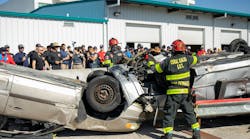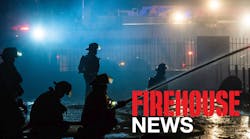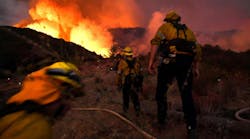With multiple-choice questions, only one of the answers can be correct. If there are four choices, three must be wrong. An answer may be correct because it is precise or because it is vague. An answer may be wrong because it is too exaggerated or too restrictive.
Consider the following question: A firefighter is required to wear the mask at any fire scene where there is a lot of smoke and whenever there is clear danger of hazardous chemicals in the air. If a firefighter's mask fails to work properly, the firefighter is to report this immediately to the officer in charge at the scene.
The officer will usually order the firefighter to work off the immediate fire scene, such as at a hydrant. The firefighter may attempt to get the mask working properly and then request to be reassigned to the fire area.Based on the paragraph above, it would be most correct to say that: A) a firefighter should wear the mask only when there is a lot of smoke at a fire sceneB) a firefighter must attempt to repair a mask which is not working properlyC) a firefighter whose mask is not working properly will be assigned to work at a hydrantD) the firefighter whose mask has been repaired can be reassigned to the fire area
In the above example, certain key words are used to make answers right or wrong. The A) choice is wrong because it contains the word "only." Without "only" A) would be a correct answer. The B) choice would be correct if it said "may" instead of "must." The C) choice is wrong because it says "will." The C) choice would be fine if it said "may" instead of "will." The D) choice is correct; it only says "can." The D) choice would be wrong it if said "must" instead of "can.
"When evaluating answer choices, the words to be on the lookout for are the little words that tend to either "harden" or "soften" statements. Words which "harden" statements, and make them difficult to defend, are strong words like: all, every, always, will, must, certainly, invariably, surely, no one, ever, any, no matter, nothing, etc. Words which "soften" statements, and make them easy to defend, are words like: some, many, sometimes, may, possibly, generally, probably, usually, often, can, could, might, occasionally, etc.
Notice how these words appear both in the "fact pattern" and in the answer choices of the example.There are times when a very "hard" statement can be a correct answer choice. For instance, in the example above, it would be correct to make up an answer choice that states, "If a firefighter's mask fails to operate properly at a fire where there is a lot of smoke, the firefighter must always notify the officer in charge."
Do not automatically rule out "hard" statements, but be careful about accepting them.Remember that the test maker must be able to defend the correct answer and defend the claim that the other three answers are wrong. These little words which "harden" or "soften" statements often help to justify whether an answer is right or wrong. (They also reflect the difference between prudent, reasonable statements and exaggerated or overly rigid statements.)
Hence, be sensitive to these little words when you are reading questions and evaluating answer choices. Get in the habit of using your pencil to underline or circle such words.
Related:
- Test Taking Tactics - Part V
- Test Taking Tactics - Part III
- Test Taking Tactics - Part II
- Test Taking Tactics - Part I
Are you interested in obtaining the competitive edge required to put your self ahead of your competition? Fireprep. com's entry level newsletter is about YOU being the best, the best prepared and best informed. This FREE periodic newsletter covers the complete firefighter examination process. Sign up today by going to www.fireprep.com Good luck!!!





